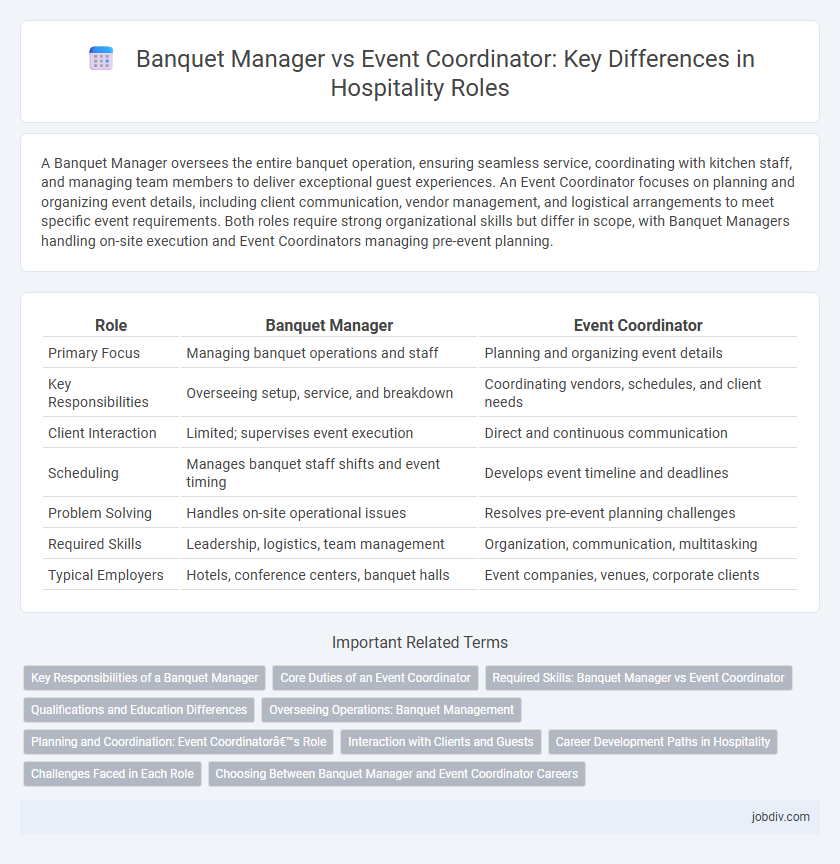A Banquet Manager oversees the entire banquet operation, ensuring seamless service, coordinating with kitchen staff, and managing team members to deliver exceptional guest experiences. An Event Coordinator focuses on planning and organizing event details, including client communication, vendor management, and logistical arrangements to meet specific event requirements. Both roles require strong organizational skills but differ in scope, with Banquet Managers handling on-site execution and Event Coordinators managing pre-event planning.
Table of Comparison
| Role | Banquet Manager | Event Coordinator |
|---|---|---|
| Primary Focus | Managing banquet operations and staff | Planning and organizing event details |
| Key Responsibilities | Overseeing setup, service, and breakdown | Coordinating vendors, schedules, and client needs |
| Client Interaction | Limited; supervises event execution | Direct and continuous communication |
| Scheduling | Manages banquet staff shifts and event timing | Develops event timeline and deadlines |
| Problem Solving | Handles on-site operational issues | Resolves pre-event planning challenges |
| Required Skills | Leadership, logistics, team management | Organization, communication, multitasking |
| Typical Employers | Hotels, conference centers, banquet halls | Event companies, venues, corporate clients |
Key Responsibilities of a Banquet Manager
A Banquet Manager oversees the entire banquet operations, including managing staff, coordinating with the kitchen, and ensuring smooth event execution to deliver exceptional guest experiences. They handle scheduling, budgeting, and compliance with safety regulations, while maintaining communication with clients and vendors. Their role emphasizes operational leadership and problem-solving to guarantee that all banquet service aspects meet high standards.
Core Duties of an Event Coordinator
An Event Coordinator in hospitality handles detailed planning and execution of events, managing logistics such as vendor communication, guest accommodations, and scheduling to ensure seamless operations. They coordinate with clients to understand event requirements, prepare budgets, and oversee setup and breakdown activities on event days. Their core duties also include troubleshooting issues in real-time, maintaining timelines, and ensuring compliance with venue policies and safety regulations.
Required Skills: Banquet Manager vs Event Coordinator
Banquet Managers require strong leadership skills, team management, and financial acumen to oversee large-scale food and beverage operations, ensuring smooth event execution and client satisfaction. Event Coordinators specialize in multitasking, detailed logistics planning, vendor negotiation, and excellent communication skills to manage event schedules and client needs effectively. Both roles demand proficiency in problem-solving, time management, and customer service, but Banquet Managers emphasize operational control while Event Coordinators focus on coordination and client interaction.
Qualifications and Education Differences
Banquet Managers typically require a bachelor's degree in hospitality management or business administration, emphasizing leadership, budgeting, and operational skills, while Event Coordinators often hold certificates or associate degrees in event planning, focusing on logistics and client communication. Banquet Managers usually possess extensive experience in managing large-scale food and beverage services, staff supervision, and venue operations, whereas Event Coordinators concentrate on coordinating event details, vendor relationships, and customer service. The educational pathways reflect these roles, with Banquet Managers benefiting from comprehensive management training and Event Coordinators gaining practical event execution expertise.
Overseeing Operations: Banquet Management
Banquet Managers oversee all aspects of banquet operations, including staff supervision, logistics coordination, and ensuring seamless service delivery during events. They manage venue setup, troubleshoot operational issues, and maintain compliance with safety and hygiene standards. In contrast, Event Coordinators focus more on event planning, client communication, and scheduling rather than the direct oversight of banquet floor operations.
Planning and Coordination: Event Coordinator’s Role
Event Coordinators specialize in detailed planning and logistical coordination, ensuring every aspect of an event aligns with client expectations and venue capabilities. They manage timelines, vendor communication, and on-site execution to deliver seamless experiences. Their role centers on orchestrating individual event components, unlike Banquet Managers who oversee broader banquet operations.
Interaction with Clients and Guests
Banquet Managers oversee the entire event execution, maintaining direct communication with clients to ensure all banquet details align with their expectations, while also supervising staff during the event to guarantee smooth service for guests. Event Coordinators primarily focus on initial client consultations and planning phases, orchestrating event logistics and coordinating with vendors to meet client requirements before the event day. Both roles prioritize client interaction but differ in timing and scope, with Banquet Managers providing real-time guest service management and Event Coordinators handling pre-event preparations.
Career Development Paths in Hospitality
Banquet Managers typically advance by gaining expertise in large-scale event logistics, team leadership, and vendor management, often progressing to roles such as Director of Banquets or Operations Manager within hospitality venues. Event Coordinators build career momentum through mastering client relations, event design, and budget management, enabling transitions into Event Management or Hospitality Sales positions. Both paths require strong organizational skills and offer opportunities for growth in diverse settings like hotels, convention centers, and catering companies.
Challenges Faced in Each Role
Banquet Managers face challenges in coordinating large teams, managing logistics for high-volume events, and ensuring seamless service quality under tight schedules. Event Coordinators encounter difficulties in client communication, customizing event details to diverse needs, and troubleshooting unexpected issues during event execution. Both roles require exceptional organizational skills and adaptability to handle dynamic event environments effectively.
Choosing Between Banquet Manager and Event Coordinator Careers
Choosing between a banquet manager and an event coordinator career depends on your passion for operations versus client interaction, as banquet managers prioritize overseeing catering staff and ensuring seamless banquet execution, while event coordinators focus on planning, organizing, and managing event details from conception to completion. Banquet managers often require strong leadership and logistical skills to manage beverages, menu settings, and venue setup, whereas event coordinators emphasize creativity, vendor negotiation, and client communication to tailor memorable experiences. Understanding the demands of hospitality venues and your personal strengths in multitasking versus relationship-building is crucial in selecting the ideal career path.
Banquet Manager vs Event Coordinator Infographic

 jobdiv.com
jobdiv.com